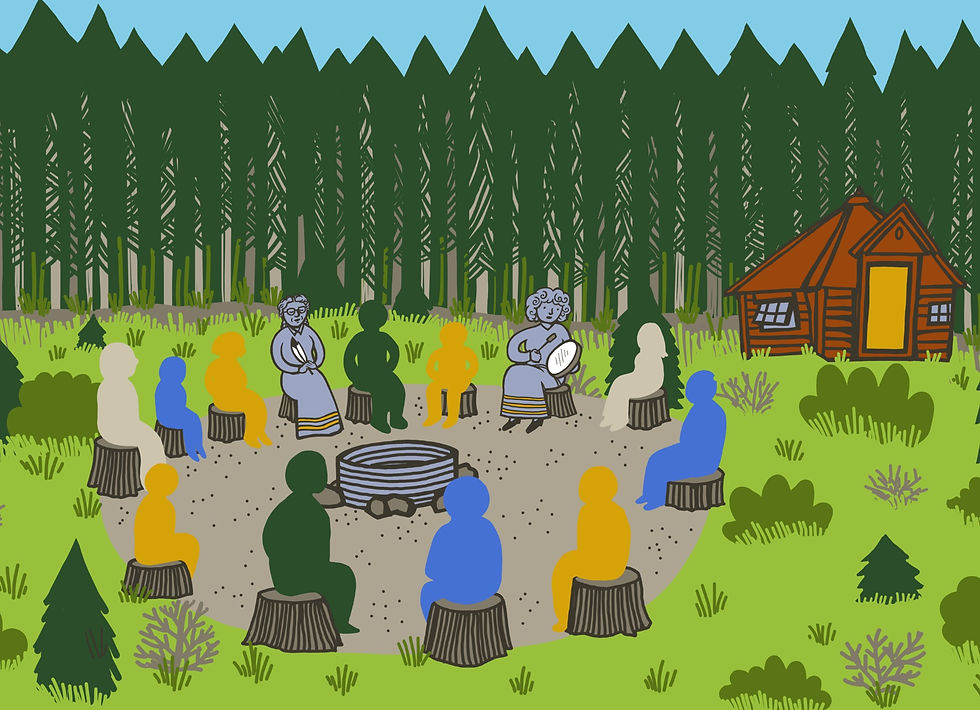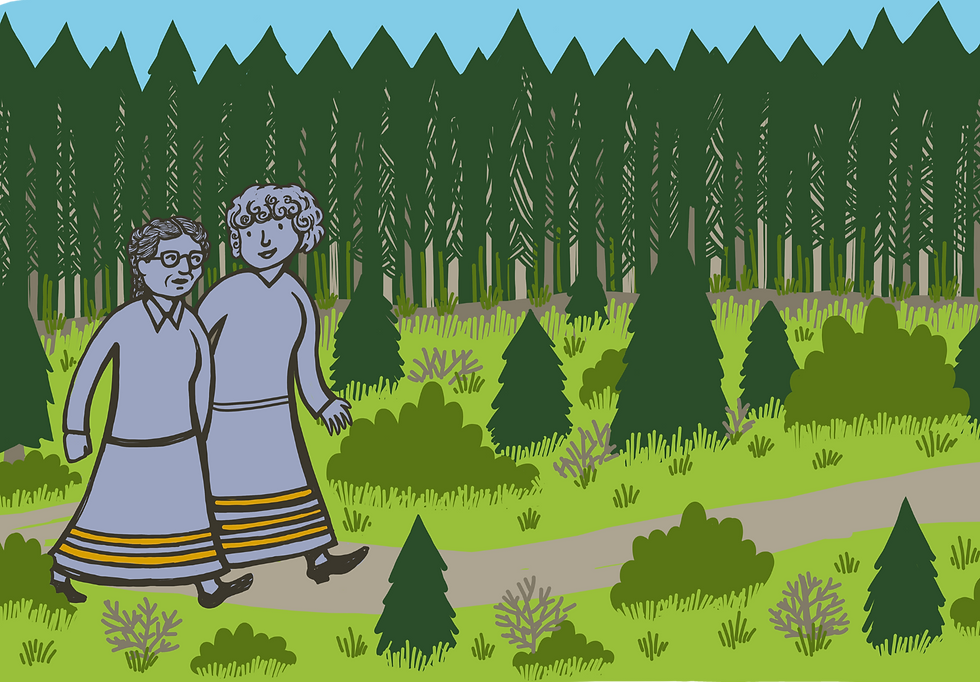5 possibilities for settler academic action

As a white, settler-Canadian, of Irish and Scottish ancestry, I do not have the authority or the knowledge to teach about Indigenous Ways. However, I do have a responsibility to engage in decolonizing practices within my spheres of influence, in order to push aside colonial ways, so that Indigenous Ways may come into the centre. I also have a responsibility to educate myself, to unlearn my colonial miseducation about Indigenous people.
As I engage in my re-education and develop decolonizing practices, I understand there is a middle ground between two distinct parallel paths: Western colonial ways and Indigenous Ways. When settlers enter this middle space, we may feel uncomfortable, uncertain, and even afraid. These unsettling feelings can be fertile ground for settler growth, and for building new relationships with Indigenous people, relationships that reject settler-colonial violence and embrace pathways forward together, based on respect, reciprocity, truth-telling, and justice.
The question I hear most often from settler academics in conversations about decolonizing the academy is, "What concrete action can I take to decolonize university education?" (or some variation on that question). Ultimately, the answer is that each non-Indigenous, settler academic needs to do the difficult and personal work of unlearning our colonial ways and learning Indigenous Ways. This work involves engagement with one's own unsettlement (Regan, 2010) through a transformative learning process, that may be based in a pedagogy of discomfort (Zembylas & McGlynn, 2012). When settlers do this difficult, unsettling work, a pathway towards decolonizing our educational practices emerges. But often people - being the human beings that we are - want a clear answer upfront, with easy steps to follow. While this blog post is not about providing easy answers, I do propose some possibilities and approaches for settler academics who are committed to engaging in this learning and unlearning journey, in a good way.
Each non-Indigenous, settler academic needs to do the difficult and personal work of unlearning our colonial ways and learning Indigenous Ways. This work involves engagement with one's own unsettlement (Regan, 2010) through a transformative learning process, that may be based in a pedagogy of discomfort (Zembylas & McGlynn, 2012).
The following five possibilities emerged from a study I conducted from 2018-2022, in which I explored through Narrative Inquiry (Clandinin & Connelly, 2000), how settler academics at a Canadian university, were learning to decolonizing their teaching and curricular practices (Mooney, 2022). Some of the ideas in this blog post were first presented at the 2023 Annual Conference of the Society for Teaching and Learning in Higher Education (STLHE).
Vampires and Saviours
Before I get to the five possibilities, a note on white vampires and white saviours in the context of settler-colonialism. Warning: Avoid being or becoming a white vampire or a white saviour. If you already have these tendencies, work to unlearn them and recover from them. White vampires and white saviours perpetuate settler-colonialism.
White vampires are white people (and non-Indigenous people) who engage with Indigenous Ways because they want to consume Indigeneity (Tuari Stewart, 2020). Vampires might include settler Canadians who fantasize about being adopted into an Indigenous community (Tuck & Yang, 2013), as well as ‘pretendians,’ non-Indigenous people who claim Indigenous identity through a great-great-grandparent or ancestor, but who have dubious affiliations with an Indigenous community (Schaelling, 2020).
White saviours, in the context of settler-colonialism, are white people (and non-Indigenous people) who see themselves as helping Indigenous people (Tuari Stewart, 2020). Saviours look down on Indigenous people as vulnerable, suffering, and in need of help. Settlers who assume this position may be seeking to relieve their guilt about the benefits they reap from colonialism. Settler saviours may root their engagement with decolonizing and Indigenizing in empathy, and a desire to help. But this position shows ignorance about and disregard for Indigenous resilience and strength. After all, Indigenous Peoples are still here, despite the relentless and genocidal efforts of settler-colonialism to eliminate them. Not only have Indigenous People endured, they are actively engaged in their own resurgence, reclaiming, preserving, and further developing their languages, cultures, and communities.
5 Possibilities for settler academic action
1. Ethical Space
Build renewed relationships in the ethical space of engagement (Ermine, 2007). Cree scholar Willie Ermine’s (2007) ethical space is a theoretical space between two vastly different cultures and peoples that calls for a new set of rules with which to engage in renewed relationship. Ojibwe author and journalist Richard Wagamese (2016) wrote that “we approach our lives on different trajectories, each of us spinning in our own separate, shining orbits. What gives this life its resonance is when those trajectories cross and we become engaged with each other” (p. 38). If the beloved, late Wagamese were still with us today, what new rules of engagement for creating the ethical space, between our different trajectories, might he advise?
These new rules of engagement must be co-created between the two distinct peoples. It is of particular importance for settlers to attend to and abide by the new set of rules in the ethical space of engagement because of the pervasive and arrogant assumption that Western knowledge systems are somehow more sophisticated than others and that mastery of Western ways of knowing and being somehow makes it possible for those educated in Western ways to understand any and all other knowledge systems (Kuokkanen, 2007). Building renewed relationships in the ethical space of engagement requires settler humility and epistemic modesty.
“We approach our lives on different trajectories, each of us spinning in our own separate, shining orbits. What gives this life its resonance is when those trajectories cross and we become engaged with each other” (Wagamese, 2016, p. 38).
2. Community
Build community with both settler and Indigenous colleagues who seek to decolonize university education. This could mean starting up a faculty-staff learning community or a community of practice that meets monthly to discuss recommended readings, to share personal experiences with decolonizing practices (the trial, error, and refinement process of improving practice), and to glean from one another's individual and collective learnings, as they emerge. The key here is to build relationships with others who are committed to the work of decolonizing the university. Building this community within the university context will help to sustain and challenge you in your individual learning and unlearning journey.
Beyond the university, build community with local Elders, Knowledge Holders, Indigenous community members, and Indigenous-focused organizations, located on the land where you live and work. It's important to understand the settler's position on Indigenous land. We are uninvited guests, who are able to make our lives on these lands because of settler-colonialism. We have a responsibility to be in right relations with the Indigenous people and communities where we live. This idea of being in right relations will look different for each of us based on our own location and the people with whom we connect, but essentially it means taking the time to learn and respect local Indigenous Ways. While it's important to do the work of educating ourselves, and consulting trust-worthy written sources is a valid part of that re-education, it's not enough to learn about Indigenous Ways by reading about them. We need to learn about local Indigenous communities in relationship with local Indigenous people. Settlers need to respectfully build renewed, ethical relationships in community with the original peoples of the land where we live and work, learn and play.
3. Critical, Self-reflection
Engage in critical, self-reflection and questioning. Reflect on your experiences, your use of language, your ways of interacting with people. Reflect on what biases and blind spots might be at play in your ways of being. Think about and question how colonial reflexes show up in your thoughts, speech, actions, and interactions.
Question your motivations for engaging in decolonizing work. Question your assumptions about decolonizing the university. Question your assumptions about Indigenous Ways of Knowing, Being, Doing, and Relating. Question the stories that have shaped your way of thinking and being, your way of understanding the world, and your way of understanding Indigenous Ways.
Question your disciplinary rules. Question your knowledge creation traditions, your knowledge hierarchies, and your disciplinary ways of being and doing. Examine your disciplinary teaching traditions. What assumptions are embedded in the pedagogies and practices of your field of specialization?
Write about your critical, self-reflection and what responses came up for you when you questioned your ways. Share this reflective writing with your community of colleagues who are working to learn and unlearn colonial ways.
"American Indians hold their lands – places – as having the highest possible meaning, and all their statements are made with this reference point in mind" (Deloria Jr. & Silko, 1972, p. 62).
